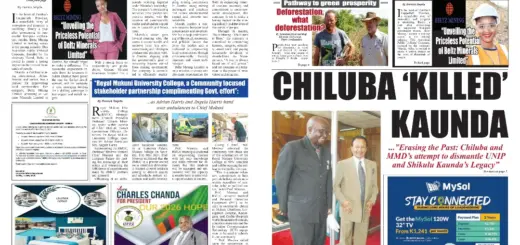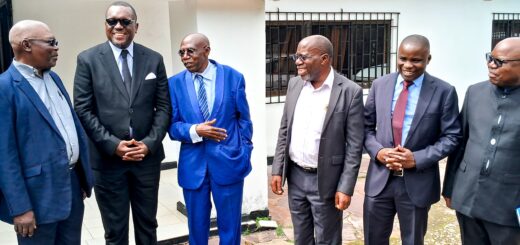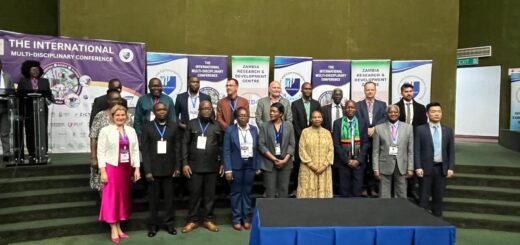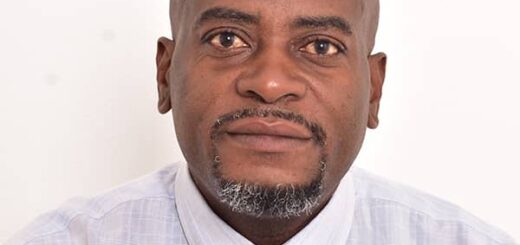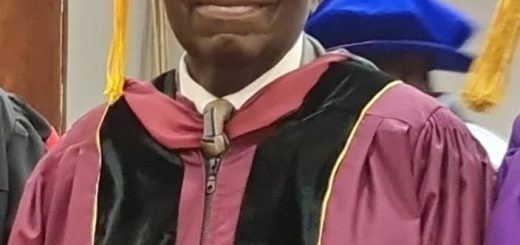Zambia increases access to Clean, Safe and Sustainable Water
Notice: Undefined index: catFilterList in /home/zambi/public_html/wp-content/plugins/wp-likes/api.php on line 243
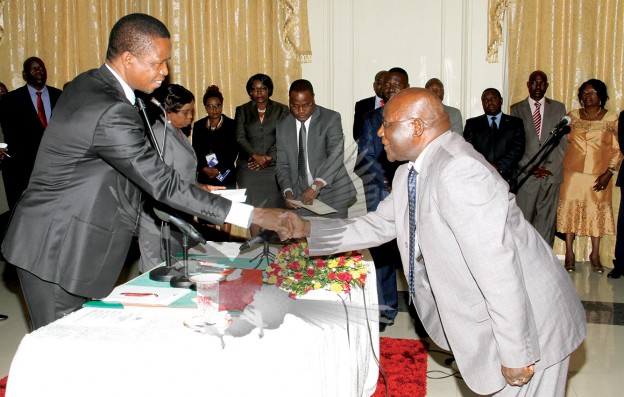
PRESIDENT Lungu congratulates Minister of General Education Dennis Wanchinga during the swearing-in ceremony
By Derrick Sinjela and Titani Zulu
LIKE many countries within the United Nations (UN) family, Zambia is determined toward sustainable access to safe water in rural and urban areas, a landscape encompassing an area of 752,614 square kilometers (290,586 square miles).
Since acceding to the 17 United Nations Sustainable Goals (UNSDG’s), the Zambian Government has remained resolute on this realistic dream through specific adherence to the goal on access to water, ascribed in UNSDG Goal 6. Ensure availability& sustainable management of Water & Sanitation for all.
Launching the Seventh National Development Plan (2017 – 2021) themed: “Accelerating Development Efforts Towards Vision 2030 Without Leaving Anyone Behind”, on Wednesday, 21st June, 2017, at Lusaka’s Mulungushi International Conference Centre (MICC), President Edgar Chagwa Lungu emphasised the importance of increasing access to water and sanitation.
“Roads and bridges, hospitals, schools, water reticulation systems and other support infrastructure have been constructed and rehabilitated thereby creating an enabling environment for socio-economic development,” President Lungu told a cross-cutting audience graced by former First President Dr. Kenneth David Kaunda, former Fourth President, Mr. Rupiah Bwezani Banda, Vice-President, Ms Inonge Mutukwa-Wina, Patriotic Front (PF), Secretary General Mr. Davies Mwila, Lusaka Mayor Wilson Kalumba, then Development Planning Minister, Mr. Lucky Mulusa, Secretary to the Cabinet, Dr. Roland Msiska and United Nations Development Programme (UNDP) Resident Coordinator, Dr. Janet Rogan.
As envisaged, proactive and prudent usage of water resources, which are abundant in Zambia, holding at least, 60 per cent within the southern African Development Community (SADC), is viewed as a backbone on which to grow the local economy and transform the country into a middle-income nation by 2030.
Water Development, Sanitation and Environmental Protection Minister Dr. Dennis Wanchinga has since launched three statutory Instruments on groundwater and boreholes, Licensing of drillers and the revised raw water fees and charges.
Dr. Wanchinga, serving in the Water Development, Sanitation and Environmental Protection portfolio since Wednesday 14th February 2018, said the Statutory Instruments will ensure the regulation of drilling and adherence to laid down standards pertaining to utilization of water sources.
The three statutory instruments (SIs) are meant to standardize groundwater and borehole activities, licensing of drillers, which Dr. Wanchinga restated as progressive measures construed to safeguard the regulation of drilling and adherence to laid-down procedures in utilisation of water resources.
“The three SI’s will ensure provision efficient and effective management of water resources across all sectors. Government arrived at these new water tariffs and charges after conducting countrywide stakeholder consultations with ordinary citizens, farmers, industries and the mining companies,” an optimistic Dr. Wanchinga restated.
Dr. Wanchinga explained that the Statutory Instruments launched recognized underground water as a public good and stressed the importance of placing emphasis on the quality of water drilled being improved.
“The move will bring on board licensed drillers as there has been public outcry on the lack of proper supervision among the drillers. I believe that the issuance of these regulations marks a milestone in Government’s resolve to achieve maximum benefits through efficient and effective utilization of water resources,” said Dr. Wanchinga, a Patriotic Front (PF) Mambilima Constituency Member of Parliament (MP) in Mwense District of Luapula Province.
Flanked by Water Development, Sanitation and Environmental Protection Permanent Secretary, Bishop Edward Chomba, Dr. Wanchinga equally prodded local and international entrepreneurs operating within Zambia’s to adherence to set standards in the Statutory Instruments to accelerate the attainment of the Zambia’s Vision 2030 targeted at achieving 100 percent access to water among rural and urban settlements.
Earlier, backing the three long-awaited interventions, Drillers Association of Zambia (DAZ), Board Secretary, Christopher Chilongo heartily welcomed the Statutory Instruments as restoring sanity in the manner drilling of boreholes will be undertaken.
“This move will contribute in promoting professionalism among drillers, by bringing coordinated value in the entire process,” a delighted Mr. Chilongo stated.
Since 2016, the Zambian government has taken steps to regulate the use of underground water with the Water Authority Management Agency (WARMA) backing the initiative meant to alleviate the threat to the nation’s water security.
WARMA believes that the legislation being implemented through Statutory Instrument (SI) 18, 19 and 20 will bear far-reaching implications for the building of dams and drilling of boreholes for domestic and commercial purposes.
Though the process of legislating the use of underground water set for implementation in early 2017, had reached an advanced stage by December 2016, Water, Sanitation and Environment Protection Minister, Dr. Dennis Wachinga signed the three Statutory instruments on Thursday 8th March 2018, after an inclusive stakeholder consultative process.
The three SI’s will expand the regulatory role of WARMA to include underground water as a way of reducing the threat to the nation’s water security, as previously regulation was restricted to above surface water.
Signing the new law on 8 March 2018, Dr. Wanchinga, said all consumers are required to remit a minimal fee averaging K250.00 on existing or would be bore holes.
“Government wants to regulate the use of underground water to alleviate the threat to the nation’s water security. All those sinking dams and drilling of boreholes for domestic and commercial purposes will be subjected to a fee and not a form of tax which will be reinvested into the sector for sustained operations,” prayed Dr. Wanchinga.
Dr. Wanchinga says licensing of drillers remains a vital consideration following a public outcry on the lack of proper supervision among the drillers while many consumers were exploited even on “Dry boreholes”.
“The issuance of the regulations marked a milestone in government’s resolve to achieve maximum benefits through efficient and effective utilization of water resources. I seek maximum cooperation and adherence to the standards set out in the Statutory Instruments from the business community for Zambia to accelerate the attainment of the country’s vision 2030 of ensuring 100 percent access to water,” pleaded Dr. Wanchinga.
Down memory lane, in the first week of December 2016, WARMA had issued an alert indicating a threat to Zambia’s water security as most rivers and dams were noticeably drying up.
“The incidences of drying dams, broken river flows and reduced ground water recharge and dry taps are not an artist impression of how things will look like in the event of climate change, it is a glaring reality,” Dr. Stephen Kapotwe, then with WARMA had warned in a 2016 Media Statement.
Seeking urgent steps fostering the nation’s water security, regulators have consistently observed this threat as being exacerbated by the illegal practice of diverting the flow of rivers.
In Zambia, more than one third of the population does not have access to clean water and more than half lacks access to proper sanitation facilities.
Water and sanitation facilities in basic schools are generally poor, as the Government’s Educational Statistical Bulletin 2004 indicates that more than 25 percent of basic schools do not have access to a safe water supply (borehole-piped, borehole-pump, piped water, or protected well) and improved sanitation facilities.
Not having access to clean and safe water leads to diseases like diarrhoea and cholera, among others. UNICEF supports the Government of the Republic of Zambia (GRZ) to achieve MDGs 7 and 10 to halve the proportion of people without sustainable access to safe drinking water and basic sanitation by 2015.
UNICEF Zambia also contributes to the health, gender, education, and poverty alleviation MDGs, as well as the water and sanitation components of Zambia’s Poverty Reduction Strategy Paper and Sixth National Development Plan.
The development of a sector-wide approach is underway and UNICEF is one of the major cooperating partners involved in this effort.
WaterAid, Country Director, Pamela Chisanga supports the regulation for sustainable management of water as a natural resource, plus monitoring of changes of water levels, water quality and effects of water abstraction overtime, particularly in case of large scale commercial use.
Water Authority Management Agency (WARMA) Acting Director General Lemmy Namayanga says the law empowers the regulator to protect the resource from abuse by uncivilized drillers and consumers.
Mr. Namayanga prefers credible boreholes lasting an average 25-40 years, imploring drilling companies to share costs where water tables do not realize sufficient water to avoid contamination.
“The law entails communities or settlements being regulated on the sinking of boreholes in which not every household is allowed to own and operate a borehole but can instead share one among three-five households in the neighborhood-by law to save the resource. All and every individual seeking to possess or already owns a borehole will now by law be expected to register the vessel and make a contribution averaging 833 units x K0.30 (ngwee) translating into K250 (US25),” explained Namayanga.
Namayanga says no household, with a plot space averaging 20×30 space is allowed to sink a borehole unless provided with a 30 metre distance from a septic tank.
“No individual will be allowed to own an individual vessel with space less than 30 metres away from the septic tank as per law requirement. Registered drilling company will be required to advise would be vessel owners to avoid depletion and contamination of water. Under the new law, which has reviewed since the early 1990s, all water consumers and their related agents have to comply with the new regulations be it commercial or domestic usage,” Namayanga told a Water and Sanitation Night (WATSAN Night) organized by WaterAid, a global nongovernmental organization biased towards water.
Namuyanga says the measure is meant to avert polluting or indiscriminate use of the abundant Zambian resource, now is under threat as evidenced with the recent outbreak of the cholera pandemic in the country that claimed 85 lives.
Gracing a forum tagged: “Ground water Regulations-what are the implications” and held on 29 March and Orange Tree in Lusaka, witnessed by experts in related geological and water related fields, Namayanga, stated the law entails all consumers and related agents ensuring they seek guidance from the regulator before venturing into water consumption.
All drilling companies need to be registered and be conversant with the specifications set out under the new regulations to avoid abuse as well as pollution of the water both in rivers or residential areas where people will need it.
Further, all existing boreholes need to be registered and a fee of US25 paid as one off for registration purposes and no one will seek a borehole without consent from WARMA to save the resource.
Namayanga restated that all rivers and other water catchments will be regulated under specified regional or area bodies under WARMA while organizations sinking boreholes in Zambia, in consultation with municipalities.
However, several stakeholders want the law to be popularized to increase compliance among commercial and domestic water consumers, as flouting of the law will surge pollution and abuse.
Namayanga is optimistic that measures employed by the three SI’s will put a stop to the abuse threatening depletion of the natural resource in Zambia.
Currently, WARMA regulates above surface water, prompting regulator into issuing a warning that the nation’s water security was under threat with most of the rivers and dams drying up.
The water regulator had also observed that the threat to the nation’s water security was exacerbated by the illegal practice of diverting the flow of rivers. The regulations involve three statutory Instruments on groundwater and boreholes, Licensing of drillers and the revised raw water fees and charges.
The Statutory Instruments will ensure the regulation of drilling and adherence to laid down standards pertaining to utilization of water sources. The SI on raw water prices is meant to ensure that the ministry provides efficient and effective management of water resources across all sectors.
The new water tariffs and charges underwent wide stakeholder consultations with farmers, industries and the mining companies.
Identification of underground water as a public good, being confined to surface water, as the quality of water will be improved once boreholes are drilled within the confines of the stipulated law.
On her part, Ms. Chisanga noted that many households in rural, urban and peri-urban areas depend on ground water and in many cases, drilling of boreholes has become an option for those that do not have access to water supplied by commercial utilities or other providers.
Use of boreholes has increased significantly especially in urban and peri urban areas where population growth has outstripped existing water supply infrastructure. At the same time, many households are not connected to sewerage lines and therefore rely on septic tanks.
In Lusaka, only 14 percent of households are connected to the sewer network while the rest depend on septic tanks and other on-site sanitation facilities that often do not meet minimum technical standards.
The risk of contamination of ground water remains high, hence the need to address, as the recent Cholera outbreak underlines. The growing demand for abstraction of ground water (and that of surface water) in Agriculture and Industries also poses significant risks for ground water, if left unregulated.
The Water Act of 2011 foresees various instruments for sustainable water resources management in order to safeguard this viable resource in the long run. The Statutory Instruments recently gazetted are part of these instruments.
WaterAid agrees with the introduction of ground water regulation on the following ground:” The regulation particularly targets ground water abstraction for large scale commercial use and will also significantly help in addressing ground water quality; communal boreholes are exempt to restrictions that apply on water usage in the statutory instrument; monitoring of ground water incurs significant costs and the one-off payment for registration of existing and new boreholes is necessary to support this; water usage fees for commercial purposes increase water use efficiency, thereby reduce abstraction, and hence safeguard our precious resources. We believe that the 10.000 litres per borehole per day (i.e. 10m³) threshold provided for households at no cost for consumption is adequate,” said Ms. Chisanga.
Ms. Chisanga says WaterAid wants the Zambian Government to invest more in water supply, sanitation and hygiene services, predominantly in urban and peri-urban areas to reduce dependency on individual boreholes.



